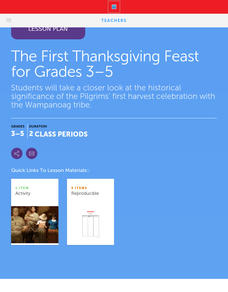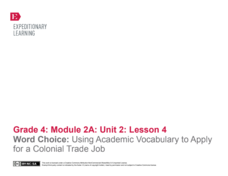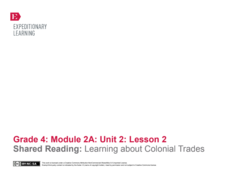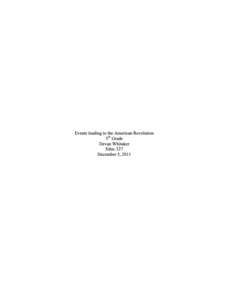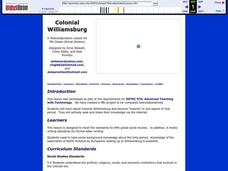Core Knowledge Foundation
Colonial Towns and Townspeople Tell It Again!™ Read-Aloud Anthology
A read-aloud anthology focuses on colonial towns and townspeople. Over three weeks, young scholars listen to stories, participate in discussions about town life, practice word work, and complete an extension activity with each lesson.
Scholastic
Pilgrim and Wampanoag Daily Life for Grades 6–8
Two slide shows, viewed side-by-side, permit middle schoolers to compare and contrast the lives of the Pilgrims of the Plimoth colony and the Wampanoags. Four videos take learners on virtual field trips to the Plymouth plantation. And an...
Scholastic
The First Thanksgiving Feast for Grades 3-5
Scholars examine the first Thanksgiving through books and interviews while they complete a KWL chart. Pretending they are part of the feast, learners craft a scrapbook page that features images related to their experience. Pupils reflect...
National Woman's History Museum
Create your own Women’s History Museum
Celebrate Women's History with a museum display. Divide the class into seven groups and assign each a different historical topic/time period. Each group member researches a different woman of that time period and creates an exhibit that...
EngageNY
Word Choice: Using Academic Vocabulary to Apply for a Colonial Trade Job
Scholars reflect upon colonial jobs such as a blacksmith, cooper, shoemaker, etc. Together, the class writes a job application as a practice for working independently. Learners employ their experience in writing a job application for a...
EngageNY
Shared Reading: Learning About Colonial Trades
Trading in Colonial America is the focus of a lesson plan that boosts reading skills. As a class, scholars examine the informational text for crucial details, use their newfound knowledge to share information with their peers, and write...
Stanford University
Declaration of Independence
Scholars work in pairs to decide whether leaders wrote the Declaration of Independence for the rich and powerful or for every man. To draw their conclusion, pairs read excerpts from two historians and complete a graphic organizer citing...
Manchester University
Events leading to the American Revolution
The Stamp Act, Paul Revere's ride, and the Boston Tea Party pushed American colonists to the tipping point that led to the American Revolution. Fifth graders research the key figures of the war, study the Declaration of Independence, and...
Jamestown-Yorktown Foundation
What Was Everyday Life like in Colonial Virginia?
What was everyday life like in Colonial Virginia? To find the answer cooperative groups work collaboratively to read an informational handout and complete a graphic organizer. The speaker of the group then shares their new-found...
Jamestown-Yorktown Foundation
What Was Everyday Life like in Colonial Virginia?
After reflecting on jobs people perform in the present day, scholars discuss what they believe jobs would have been like in Colonial Virginia during the American Revolution. Small groups then perform a jigsaw using informational packets....
K12 Reader
The Mayflower
The journey aboard the Mayflower in 1620 was long and arduous for the Pilgrims set for the New World. Learn about the difficulties of the expedition, including the extended timeframe and cramped quarters, with an informative reading...
North Carolina Consortium for Middle East Studies
The French and Indian War: The War That Shaped America’s Destiny
How would a Frenchman, Englishman, and Native American have each viewed the French and Indian War? Your young historians will learn about their unique perspectives and the war as a whole through a role-playing activity, engaging...
Stanford University
King Philip's War
King Philip's War was the crescendo of a violent period between the Pequot and English colonists. Using documents from English settlers, including a contemporary report on the conflict, learners explore the little-known period. They then...
Stanford University
Boston Massacre
The Boston Massacre was a propaganda victory for those protesting British rule over the American colonies. By using images from Patriots, as well as the testimony of witnesses, scholars consider what may have happened on that fateful day...
Alabama Department of Archives and History
La Mobile: A Case Study of Exploration and Settlement
The Le Moyne brothers, Jean-Baptiste and Pierre, were among the first explorers of the Gulf Coast. Class members read biographical information and journal entries about these men, study maps showing where the settlements they established...
Curated OER
Harvesting the New World: Changing Land Uses and Contact Between Cultures in Colonial Times
Ninth graders differentiate the Native American and European values. For this world history lesson, 9th graders define colonialism in their own words. They study the effects of epidemics and other diseases to Native American populations.
Curated OER
Colonial Williamsburg
Fifth graders share information on one aspect of colonial life with an email partner each week. They take on the personal of a character from Colonial iamsburg and tell their partner about they have done that day with a focus on a...
Curated OER
Colonial America and Revolution
Fourth graders explore U.S. history by creating a timeline of the Colonial era. In this American Revolution lesson, 4th graders identify and discuss the conflicts that led to the revolution and list ways people deal with conflicts....
Curated OER
Life in Colonial Times
Fifth graders examine significant ideas, beliefs and themes in US history. They identify causes and effects of historical events in the American Revolution. Evaluate critical issues and events. Analyze the views and lives of people of...
Curated OER
Wall Street Journal: Is This Stone Linked to the Lost Colony of Roanoke?
The Dare Stones have long been a thorn in the mystery surrounding the Lost Colony of Roanoke Island. The first stone was found in 1937 and had an inscription that was originally thought to have been carved by Eleanor Dare, daughter of...




